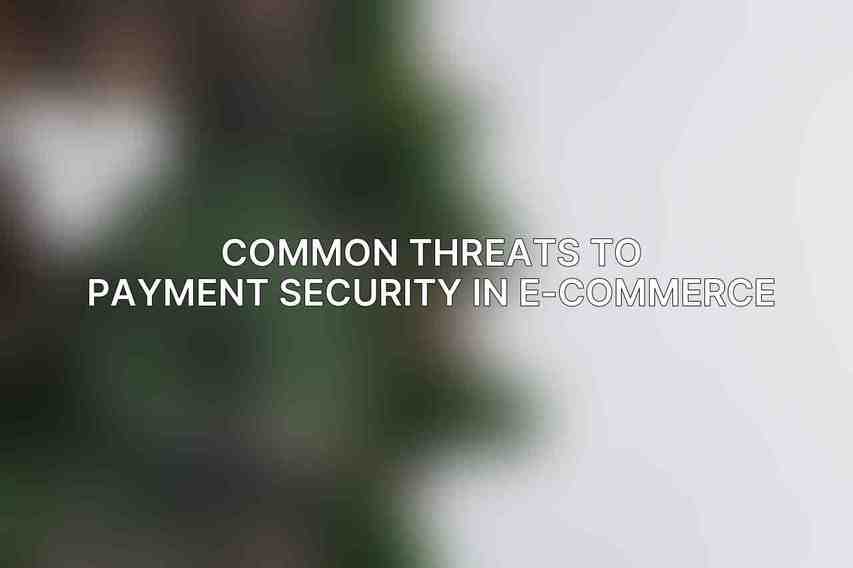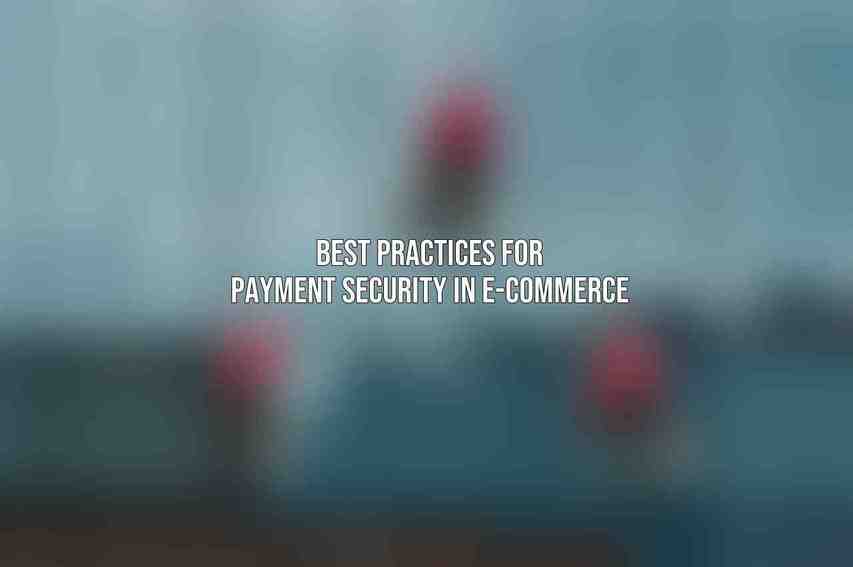payment security holds paramount importance. It refers to the measures taken to protect sensitive payment information during online transactions. For businesses and consumers alike, ensuring payment security is crucial for maintaining trust and credibility in the digital marketplace. The rise in online shopping has led to an increased focus on secure payment methods to safeguard financial details from cyber threats.
The significance of payment security cannot be overstated. For businesses, a breach in payment security can result in severe financial losses, damage to reputation, and legal implications. On the other hand, consumers face the risk of identity theft, fraud, and unauthorized transactions if their payment information is compromised. Payment security breaches can have far-reaching consequences that impact both the financial world and consumer trust in online transactions.
Common Threats to Payment Security in E-commerce

A. Phishing Scams
Phishing involves fraudulent attempts to obtain sensitive information, such as usernames, passwords, and credit card details, by disguising as a trustworthy entity. These scams are often carried out through deceptive emails, websites, or messages. In e-commerce, phishing attacks target unsuspecting customers to trick them into divulging their payment information. Case studies have shown how sophisticated phishing techniques have led to significant financial losses for both businesses and individuals. Find out about Navigating International Payment Options for E-commerce
B. Malware Infections
Malware poses a significant threat to e-commerce transactions by targeting vulnerabilities in online systems. Various types of malware, such as ransomware and keyloggers, can compromise payment information and user data. Malicious emails and infected websites are common distribution methods for malware, resulting in data breaches that expose sensitive financial details to cybercriminals.
C. Man-in-the-Middle Attacks
Man-in-the-Middle attacks occur when a cyber attacker intercepts communication between two parties to steal sensitive information, including payment details. Vulnerabilities in e-commerce systems can be exploited by attackers using techniques to intercept and manipulate data exchanges. Instances of man-in-the-middle attacks highlight the need for robust security measures to protect payment information during online transactions. Dive deeper into How to Integrate Payment Solutions into Your E-commerce Site
D. Social Engineering Attacks
Social engineering tactics involve manipulating individuals into divulging confidential information or performing actions that compromise security. In e-commerce, fraudsters employ various social engineering methods to deceive users and gain access to payment credentials. Real-world examples demonstrate the effectiveness of social engineering attacks in exploiting human vulnerabilities to bypass payment security protocols.
Best Practices for Payment Security in E-commerce

In this digital world, adopting best practices for payment security is essential to mitigate risks and safeguard online transactions. Implementing robust security measures helps prevent fraud, maintain customer trust, and ensure compliance with industry standards.
A. Encryption and Tokenization
Utilizing encryption and tokenization techniques enhances data security by converting sensitive information into unreadable formats. Encryption protects payment data during transmission, while tokenization replaces this data with randomized tokens, reducing the risk of exposure to cyber threats. The benefits of encryption and tokenization include enhanced data privacy and compliance with regulatory requirements. Discover our thoughts on Top E-commerce Payment Gateways Reviewed for 2024
B. PCI DSS Compliance
Adhering to the Payment Card Industry Data Security Standard (PCI DSS) ensures that businesses follow strict guidelines to protect payment card information. Compliance with PCI DSS mandates secure card processing, network protection, and regular security assessments to mitigate vulnerabilities. Upholding PCI DSS requirements offers benefits such as reduced fraud risks and improved customer trust in secure payment processes.
C. Fraud Detection and Prevention Systems
Deploying fraud detection systems equipped with advanced algorithms helps identify suspicious activities and anomalies in e-commerce transactions. Fraud detection mechanisms like fraud scoring and anomaly detection enable real-time monitoring of transactions for signs of fraudulent behavior. Integrating these systems into e-commerce platforms strengthens security measures and mitigates potential risks of payment fraud.
D. Strong Authentication Mechanisms
Implementing two-factor authentication (2FA) and multi-factor authentication (MFA) protocols enhances user verification processes and reduces the likelihood of unauthorized access to payment accounts. Strong authentication mechanisms require users to provide additional credentials beyond passwords, such as OTPs or biometric data, to complete transactions securely. Case studies demonstrate the effectiveness of robust authentication methods in preventing unauthorized payment activities.
E. Secure Payment Gateways
Payment gateways serve as intermediaries between merchants and financial institutions, facilitating secure online transactions by encrypting payment data and ensuring secure data transmission. These gateways support security features like SSL encryption and tokenization to protect payment details from interception by cyber attackers. Selecting a secure payment gateway is crucial for ensuring the integrity and confidentiality of payment information in e-commerce transactions.
Emerging Trends in Payment Security
As technology evolves, new trends in payment security emerge to address evolving threats and enhance transaction security in the digital realm.
A. Contactless Payments
The adoption of contactless payment technologies, such as Near Field Communication (NFC) and Radio-Frequency Identification (RFID), offers convenient and fast payment options for consumers. While contactless payments provide benefits like improved transaction speed and reduced physical contact, concerns regarding security vulnerabilities exist. Implementing robust security measures, like tokenization and transaction encryption, enhances the protection of contactless payment systems against potential fraud risks.
B. Blockchain for Payment Security
Blockchain technology provides a decentralized and transparent platform for secure transactions, offering immutable records and enhanced data integrity. By leveraging blockchain for payment security, businesses can establish tamper-resistant ledgers that safeguard payment information from unauthorized alterations. Despite the advantages of blockchain in enhancing payment protection, challenges such as scalability and regulatory compliance need to be addressed for widespread adoption in e-commerce transactions.
C. Artificial Intelligence for Fraud Detection
Artificial Intelligence (AI) plays a crucial role in advancing fraud detection capabilities in e-commerce through the deployment of machine learning algorithms that analyze transaction patterns and detect anomalies. AI-powered fraud detection systems enable proactive identification of suspicious activities, enhancing the accuracy and efficiency of fraud prevention measures. Case studies showcasing the effectiveness of AI in detecting fraudulent transactions highlight its potential in strengthening payment security protocols.
ensuring payment security in e-commerce transactions is imperative to protect sensitive payment information, maintain customer trust, and mitigate the risks of fraud and data breaches. By implementing best practices such as encryption, PCI DSS compliance, and fraud detection systems, businesses can enhance the security of online transactions and safeguard against evolving cyber threats. Embracing emerging trends like contactless payments, blockchain technology, and AI-powered fraud detection further fortifies payment security measures for future transactions. As the digital world continues to evolve, ongoing vigilance, adherence to security protocols, and advancements in technology will be essential in securing e-commerce transactions and fostering a safe and trusted online shopping environment.
References:1. Payment Card Industry Data Security Standard (PCI DSS)2. Blockchain Technology in Payment Security3. Artificial Intelligence for Fraud Detection in E-commerce4. Contactless Payment Technologies5. Encryption and Tokenization in Payment Security
Frequently Asked Questions
What is e-commerce payment security?
E-commerce payment security refers to the measures put in place to protect online transactions from fraud, data breaches, and other risks that could compromise customer payment information.
Why is payment security important in e-commerce?
Payment security is vital in e-commerce to build trust with customers, protect sensitive financial information, and prevent financial losses from fraud or cyber attacks.
What are common payment security challenges in e-commerce?
Common payment security challenges in e-commerce include phishing attacks, data breaches, fraudulent transactions, and inadequate security measures on online platforms.
How can e-commerce businesses ensure payment security for their customers?
E-commerce businesses can ensure payment security by implementing encryption technologies, using secure payment gateways, conducting regular security assessments, and educating customers about safe online practices.
What are some best practices for maintaining payment security in e-commerce transactions?
Some best practices for maintaining payment security in e-commerce transactions include using multi-factor authentication, updating security software regularly, monitoring transaction activity for any suspicious behavior, and complying with industry security standards such as PCI DSS.

